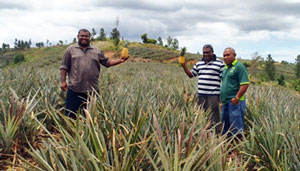The Pacific Horticulture and Agricultural Market Access Program in Fiji, better known as PHAMA, turned one at the end of 2012 and what a year it's been.
With seven projects completed and nine new projects identified, the program hit the ground running and hasn't stopped.
PHAMA is an AusAID-funded initiative designed to provide practical and targeted assistance to help Pacific Island Countries manage the regulatory aspects associated with exporting agricultural products. This encompasses gaining access for new products into new markets, as well as helping to manage issues associated with maintaining existing trade.
Fresh taro has long been Fiji's most valuable horticultural export crop, with sales averaging 10,000 tons per year, worth over Fj$24 million. Historically, exports to Australia and New Zealand, Fiji's two major markets, have been plagued with quality problems including damage to taro, poor cleaning and pest infestation. This has resulted in the frequent need for fumigation and the occasional destruction of export consignments, all of which mean additional costs for exporters, reduced shelf-life and reduced prices.
In 2012, PHAMA worked with the Biosecurity Authority of Fiji, Fiji's Department of Agriculture, and industry to help improve export quality and hence reduce quarantine issues. These efforts have centred on the development of export quality standards and guidelines and promotion of these to growers, pack-house operators, exporters, and quarantine staff. This work has been carried out in close coordination with another project funded by the Australian Centre for International Agricultural Research (ACIAR), which aims to reduce damage to taro through adoption of improved packaging and handling procedures.
According to PHAMA's team leader, Richard Holloway, the results are beginning to show.
'Evidence is emerging of a marked reduction in pest intercepts, and improved quality at the Australian and New Zealand borders. New Zealand's Ministry of Primary Industry reported an unprecedented 'clean' result following recent sample inspections. Australia's Department of Forestry and Fisheries also commented on a marked improvement,' Mr Holloway said.
PHAMA has also been leading the way in improving pineapple exports to New Zealand.
Fiji grows great pineapples while New Zealand can't grow them at all, making a perfect recipe for trade. However, the trade has been slow to develop due to the lack of clarity around the specific import conditions imposed by New Zealand's Ministry of Primary Industry, and lack of understanding in Fiji on how best to meet these conditions.
PHAMA recently worked with the Biosecurity Authority of Fiji, Fiji's Ministry of Agriculture and growers to seek clarification from New Zealand's Ministry of Primary Industry concerning import conditions relating to physiological maturity and post-harvest handling. This has resulted in a general simplification of conditions and has rekindled interest from Fijian producers and exporters in resuming exports.

